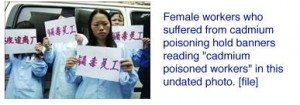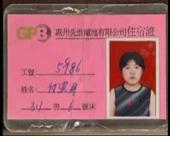She said she was confident that they would win the case. "They quit their jobs because they were afraid their health would deteriorate due to the cadmium poisoning. The local government and their employers assured them of the future responsibilities thus incurred," she said.
The women worked for two factories Xianjin Battery Factory and GP Battery Factory both of which make batteries for GP Batteries International Ltd, a Singapore-listed company.
The women quit in 2004 after the Guangdong Provincial Occupational Diseases Prevention Hospital found that 177 workers at the factories had abnormally high levels of cadmium in their blood. Some of them had suffered from severe aches and pains, headaches and hair loss. They received compensations ranging from 3,000 yuan (US$370) to 20,000 yuan (US$2,470).
Earlier this year, 224 former workers at GP Batteries' manufacturing plant in Huizhou filed a lawsuit seeking compensation of 250,000 yuan (US$30,830) each for cadmium poisoning. They lost that suit because the law does not cover future illnesses.
Last year, 65 of the plaintiffs filed a new suit, this time asking to be hired again. The local court did not accept the case. A group of 146 women filed latest suit following the deaths of three of their former workers.
"Three of our former co-workers have died from cadmium poisoning this year, and another one has given birth to a baby with blackened skin," said Liu Hongmei, one of the plaintiffs. "We need to be rehired or given compensation."
She said her boss had initially given the workers up to 15 days to decide whether to remain on the job or quit with some compensation after evidence of cadmium poisoning emerged in 2004.
"We were all frightened to death and most of us chose to quit," she said. "The so-called compensation was inadequate and we regret quitting our jobs."
She said she was confident that they would win the case. "They quit their jobs because they were afraid their health would deteriorate due to the cadmium poisoning. The local government and their employers assured them of the future responsibilities thus incurred," she said. The women worked for two factories Xianjin Battery Factory and GP Battery Factory both of which make batteries for GP Batteries International Ltd, a Singapore-listed company. The women quit in 2004 after the Guangdong Provincial Occupational Diseases Prevention Hospital found that 177 workers at the factories had abnormally high levels of cadmium in their blood. Some of them had suffered from severe aches and pains, headaches and hair loss. They received compensations ranging from 3,000 yuan (US$370) to 20,000 yuan (US$2,470). Earlier this year, 224 former workers at GP Batteries' manufacturing plant in Huizhou filed a lawsuit seeking compensation of 250,000 yuan (US$30,830) each for cadmium poisoning. They lost that suit because the law does not cover future illnesses. Last year, 65 of the plaintiffs filed a new suit, this time asking to be hired again. The local court did not accept the case. A group of 146 women filed latest suit following the deaths of three of their former workers. "Three of our former co-workers have died from cadmium poisoning this year, and another one has given birth to a baby with blackened skin," said Liu Hongmei, one of the plaintiffs. "We need to be rehired or given compensation." She said her boss had initially given the workers up to 15 days to decide whether to remain on the job or quit with some compensation after evidence of cadmium poisoning emerged in 2004. "We were all frightened to death and most of us chose to quit," she said. "The so-called compensation was inadequate and we regret quitting our jobs."



